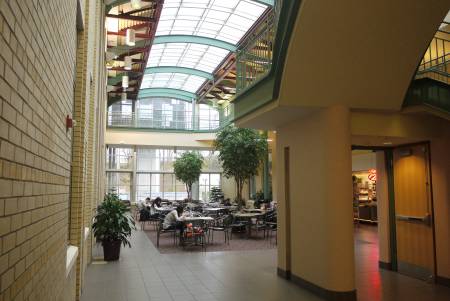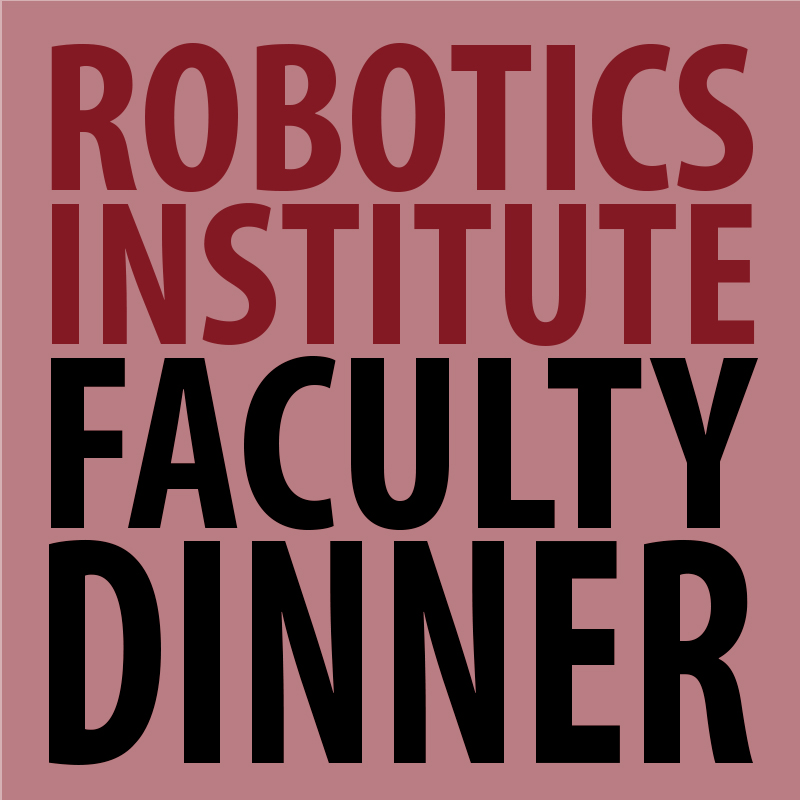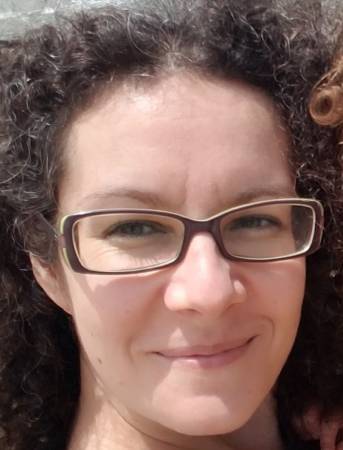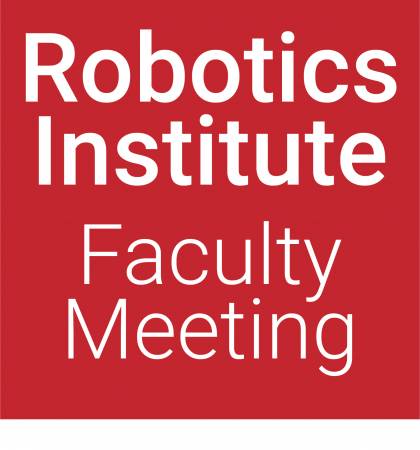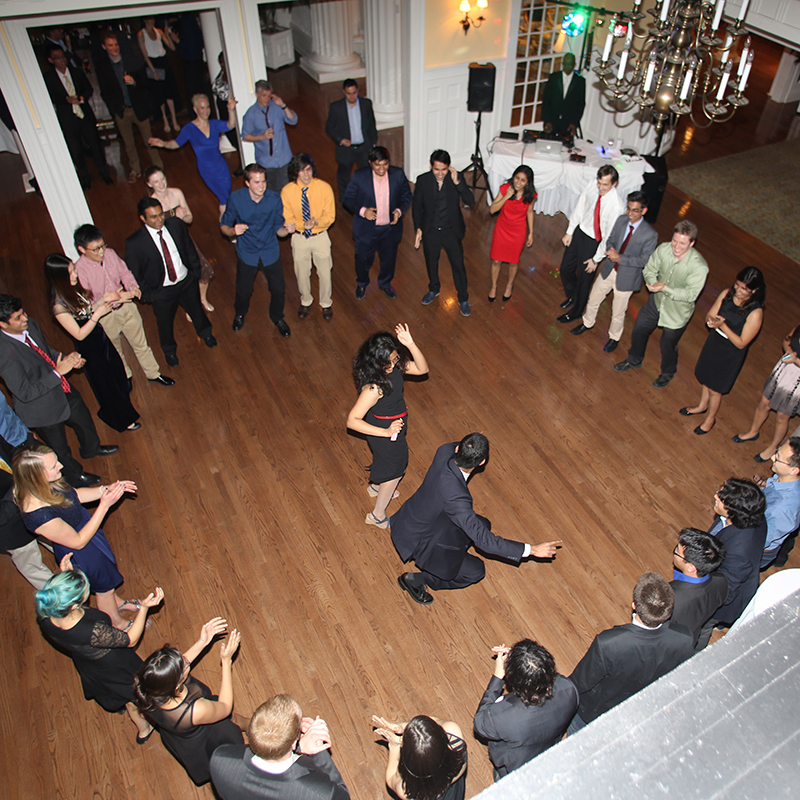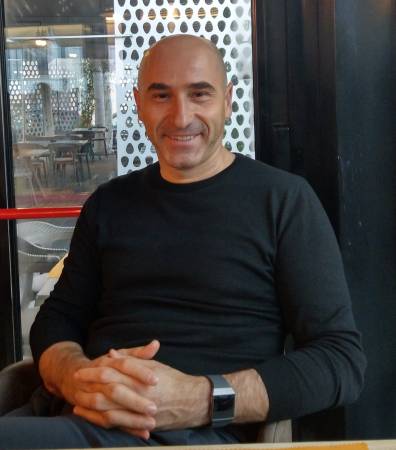Robotics Institute Administrative Staff Winter Tree Lunch
Please join us for our annual Robotics Institute Administrative Staff Winter Tree Decorating Lunch. A light lunch will be provided but staff-created treats will always be welcomed.
Carnegie Mellon University
Expressive Real-time Intersection Scheduling: New Methods for Adaptive Traffic Signal Control
Abstract: Traffic congestion is a widespread problem throughout global metropolitan areas. In this thesis, we consider methods to optimize the performance of traffic signals to reduce congestion. We begin by presenting Expressive Real-time Intersection Scheduling (ERIS), a schedule-driven intersection control strategy that runs independently on each intersection in a traffic network. For each intersection, ERIS [...]
Carnegie Mellon University
Open-world 3D Object Detection
Abstract: Perception for autonomous robots presents a set of unique challenges: finding the right representation for 3D signals, adapting to an open-world setting, and exploiting geometric priors. Successfully detecting objects regardless of their labels lays a solid foundation for safe navigation. I will present two of my recent works in this line. First, I will [...]
Towards Weakly-Supervised Visual Understanding
Abstract: Learning with weak and self-supervisions recently emerged as compelling tools towards leveraging vast amounts of unlabeled or partially-labeled data. In this talk, I will present some of the latest advances in weakly-supervised visual scene understanding from NVIDIA. Specifically, I will summarize and discuss some challenges and potential solutions in weakly-supervised learning, and introduce our [...]
MSR Thesis Talk: Jenny Nan
Title: Combining Deep Learning and Verification for Precise Object Instance Detection Abstract: Deep learning based object detectors often return false positives with very high confidence. Although they optimize generic detection performance, such as mean average precision (mAP), they are not designed for reliability. For a reliable detection system, if a high confidence detection is [...]
Carnegie Mellon University
MSR Thesis talk – Vasu Agrawal
Title: Ground Up Design of a Multi-modal Object Localization System Abstract: Rapid situational awareness is the key to enabling a successful response from first responders during an emergency, where time is of the essence. Emergency personnel are often sent into incident scenes to gather information, but this is often a dangerous and slow process. Subterranean environments [...]
MSR Thesis Talk – Swaminathan Gurumurthy
Title: Improving generalization in data-driven models with task-specific knowledge Abstract: With the rise of the over-parameterized deep learning models and massive datasets, many have started advocating towards minimizing the amount of prior knowledge added to a learning model. Ironically, the traditional machine learning community advocated for exactly the opposite. Whereas the latter assumes knowledge of [...]
RI Winter Party
Robotics Institute Winter Party Please join us for some fun, food, beverages and conversation! All RI faculty, staff, students and visitors are invited to the Robotics Institute Winter Party! We apologize but due to space limitations in the Atrium we regretfully cannot include family or other non-RI guests.
Imaging without focusing: A computational approach to miniaturizing cameras
Abstract: Miniaturization of cameras is key to enabling new applications in areas such as connected devices, wearables, implantable medical devices, in vivo microscopy, and micro-robotics. Recently, lenses were identified as the main bottleneck in miniaturization of cameras. Standard smaller lens-system camera modules have a thickness of about 10 mm or higher, and reducing the size [...]
MRSD Annual Poster Presentation
Nine RI MRSD program student teams will use posters, videos, and hardware to show their project work on truck crash avoidance, balance recovery, construction via UAVs, room tidying, crop disease detection, beach cleaning, temperature field sensing, UGV-UAV firefighting, and multirover moon pit modeling. Website: https://mrsd.ri.cmu.edu/project-examples/student-project-websites/spring-2019-fall-2019/
Adaptive Planning and Control of Wheeled Mobile Robots in Challenging Environments
Abstract: Over the last two decades, we have seen driverless cars conquer the Mojave desert, drive on mars and operate on our streets and warehouses. One of the most fundamental requirements of such robots is their ability to navigate their environment with minimal human oversight. As more robots graduate from the confines of laboratories to [...]
Towards photo-realistic face digitization from monocular videos
Abstract: Recent advances in face capture now enable digitizing high-quality 3D faces for the entertainment industry. Standardized digitization solutions, however, require tailor-made capture systems and extensive manual work, making them expensive and hard to deploy. With the advent of commodity sensors, new lightweight approaches that push the boundaries of human digitization have been introduced, slowly [...]
When to use CNNs for Inverse Problems in Vision
Abstract: Reconstruction tasks in computer vision aim fundamentally to recover an undetermined signal from a set of noisy measurements. Examples include super-resolution, image denoising, and non-rigid structure from motion\cite{Kong_2019}, all of which have seen recent advancements through deep learning. However, earlier work made extensive use of sparse signal reconstruction frameworks (e.g. convolutional sparse coding). While [...]
Toward telelocomotion: human sensorimotor control of contact-rich robot dynamics
Abstract: Human interaction with the physical world is increasingly mediated by automation -- planes assist pilots, cars assist drivers, and robots assist surgeons. Such semi-autonomous machines will eventually pervade our world, doing dull and dirty work, assisting the elderly and disabled, and responding to disasters. Recent results (e.g. from the DARPA Robotics Challenge) demonstrate that, [...]
2020 RI Faculty Dinner
Invitation with information will be emailed to invitees.
Formal Synthesis for Robots
Abstract: In this talk I will describe how formal methods such as synthesis – automatically creating a system from a formal specification – can be leveraged to design robots, explain and provide guarantees for their behavior, and even identify skills they might be missing. I will discuss the benefits and challenges of synthesis techniques and [...]
Reconstructing 3D Human Avatars from Monocular Images
Abstract: Statistical 3D human body models have helped us to better understand human shape and motion and already enabled exciting new applications. However, if we want to learn detailed, personalized, and clothed models of human shape, motion, and dynamics, we require new approaches that learn from ubiquitous data such as plain RGB-images and video. I [...]
Carnegie Mellon University
Learning Dense 3D Object Reconstruction without Geometric Supervision
Abstract: Geometric alignment across visual data has been the fundamental issue for effective and efficient computer vision algorithms. The established pixel correspondences between images indirectly infer the underlying 3D geometry, physically or semantically. While this builds the foundation of classical multi-view 3D reconstruction algorithms such as Structure from Motion (SfM) and Simultaneous Localization and Mapping [...]
Extreme Motions in Biological and Engineered Systems
Abstract: Dr. Temel’s work mainly focuses on understanding the dynamics and energetics of extreme motions in small-scale natural and synthetic systems. Small-scale biological systems achieve extraordinary accelerations, speeds, and forces that can be repeated with minimal costs throughout the life of the organism. Zeynep uses analytical and computational models as well as physical prototypes to learn about these systems, test [...]
Reasoning about complex media from weak multi-modal supervision
Abstract: In a world of abundant information targeting multiple senses, and increasingly powerful media, we need new mechanisms to model content. Techniques for representing individual channels, such as visual data or textual data, have greatly improved, and some techniques exist to model the relationship between channels that are “mirror images” of each other and contain [...]
Spring 2020 RI Reappointment & Promotion Preview Meeting – For RI Voting Faculty Only
Vision Tool Seminar: Hydra
Abstract: Hydra is an open-source Python framework developed at FAIR that aims to reduce the amount of boilerplate code in research and other complex applications. The key feature is the ability to dynamically create a hierarchical configuration by composition and override it through config files and the command line. The name Hydra comes from its [...]
CANCELLED
Building Trust in Real World Applications of Vision Based Machine Learning
Abstract: In all machine learning problems, there is an explicit trade off between cost and benefit. In real world vision problems, this optimization becomes increasingly difficult since those trade offs directly impact technology and product development as well as business strategy. For any successful business case, it is critical that the cost/benefit trade offs in [...]
Tendon Driven Foam Hands
Abstract: There has been great progress in soft robot design, manufacture, and control in recent years, and soft robots are a tool of choice for safe and robust handling of objects in conditions of uncertainty. Still, dexterous in-hand manipulation using soft robots remains a challenge. This talk introduces a novel class of soft robots in [...]
Knowledge Infused Deep Learning
Abstract: This talk is motivated by the following thesis: Background knowledge is key to intelligent decision making. While deep learning methods have made significant strides over the last few years, they often lack the context in which they operate. Knowledge Graphs (and more generally multi-relational graphs) provide a flexible framework to capture and represent knowledge [...]
Carnegie Mellon University
Towards a Good Representation For Reinforcement Learning
Abstract: Deep reinforcement learning has achieved many successes over the recent years. However, its high sample complexity and the difficulty in specifying a reward function have limited its application. In this talk, I will take a representation learning perspective towards these issues. Is it possible to map from the raw observation, potentially in high dimension, [...]
Yes, That’s a Robot in Your Grocery Store. Now what?
Abstract: Retail stores are becoming ground zero for indoor robotics. Fleet of different robots have to coexist with each others and humans every day, navigating safely, coordinating missions, and interacting appropriately with people, all at large scale. For us roboticists, stores are giant labs where we're learning what doesn't work and iterating. If we get [...]
Learning to Reconstruct 3D Humans
Abstract: Recent advances in 2D perception have led to very successful systems, able to estimate the 2D pose of humans with impressive robustness. However, our interactions with the world are fundamentally 3D, so to be able to understand, explain and predict these interactions, it is crucial to reconstruct people in 3D. In this talk, I [...]
Carnegie Mellon University
Eye Gaze for Assistive Manipulation
Abstract: Full robot autonomy is the traditional goal of robotics research. To work in a human-inhabited world, however, robots will often need to collaborate with humans. Many scenarios require human users to teleoperate robots to perform tasks, a paradigm that appears everywhere from space exploration, to disaster recovery, to assistive robotics. This collaboration enables tasks [...]
CANCELLED
Abstract: Before learning robots can be deployed in the real world, it is critical that probabilistic guarantees can be made about the safety and performance of such systems. In recent years, safe reinforcement learning algorithms have enjoyed success in application areas with high-quality models and plentiful data, but robotics remains a challenging domain for scaling [...]
Deep Learning for Understanding Dynamic Visual Data
Abstract: Perceiving dynamic environments from visual inputs allows autonomous agents to understand and interact with the world and is a core topic in Artificial Intelligence. The success of deep learning motivates us to apply deep learning techniques to the perception of dynamic visual data. However, how to design and apply deep neural networks to effectively [...]
Carnegie Mellon University
Stability-Centric Mechanics for Rigid Body Manipulation
Abstract: The repertoire of human manipulation is filled with creative use of contacts to move the object about the hand and the environment. It’s the combination of these skills that makes human manipulation dexterous. However, in most robotic applications the robot just fix all contact points on the object and do grasping. Reliable robot manipulation [...]
Optimizing for coordination with people
https://youtu.be/AQ-w5o2oGI8 Abstract: From autonomous cars to quadrotors to mobile manipulators, robots need to co-exist and even collaborate with humans. In this talk, we will explore how our formalism for decision making needs to change to account for this interaction, and dig our heels into the subtleties of modeling human behavior -- sometimes strategic, often irrational, [...]
Analyzing Grasp Contact via Thermal Imaging
Abstract: Grasping and manipulating objects is an important human skill. Because contact between hand and object is fundamental to grasping, measuring it can lead to important insights. However, observing contact through external sensors is challenging because of occlusion and the complexity of the human hand. I will discuss the use of thermal cameras to capture [...]
Numerical Methods for Things That Move: From Quadrupeds to Starships
Abstract: Recent advances in motion planning and control have led to dramatic successes like SpaceX’s rocket landings and Boston Dynamics’ humanoid robot acrobatics. However, the underlying numerical methods used in these applications are typically decades old, not tuned for high performance on planning and control problems, and are often unable to cope with the types [...]
Carnegie Mellon University
Combining Multiple Heuristics: Studies on Neighborhood-base Heuristics and Sampling-based Heuristics
Abstract: This thesis centers on the topic of how to automatically combine multiple heuristics. For most computationally challenging problems, there exist multiple heuristics, and it is generally the case that any such heuristic exploits only a limited number of aspects among all the possible problem characteristics that we can think of, and by definition, is [...]
Fast Foveation for LIDARs, Projectors and Cameras
Abstract: Most cameras today capture images without considering scene content. In contrast, animal eyes have fast mechanical movements that control how the scene is imaged in detail by the fovea, where visual acuity is highest. This concentrates computational (i.e. neuronal) resources in places where they are most needed. The prevalence of foveation, and the wide [...]
POSTPONED – 2020 Robotics Institute Semi-formal
Due to uncertainty and developing conditions of the coronavirus (COVID-19) outbreak, the Robotics Institute at Carnegie Mellon has determined it best to postpone our planned RI Semi-formal activity on March 20, 2020. More information will be sent out once a new date has been selected. __________________POSTPONED _____________________ By invitation only: The 2020 Robotics Institute Semi-formal [...]
Carnegie Mellon University
Robotic Grasping in the Wild
Zoom Link Abstract Robotics and artificial intelligence have witnessed tremendous progress in the past decade. Yet, we are still far from building the general purpose robot butler that can autonomously operate in homes and help with manipulation tasks like household chores. Grasping is an important action primitive for manipulation and needs to generalize to unstructured [...]
Carnegie Mellon University
Resource-constrained learning and inference for visual perception
Zoom Link Abstract Real-world applications usually require computer vision algorithms to meet certain resource constraints. In this talk, I will present evaluation methods and principled solutions for both cases of training and testing. First, I will talk about a formal setting for studying training under the non-asymptotic, resource-constrained regime, i.e., budgeted training. We analyze the [...]
Carnegie Mellon University
Multi-hypothesis iSAM2 for Ambiguity-aware Passive and Active SLAM
Archived video Abstract Simultaneous localization and mapping (SLAM) is the problem of estimating the state of a moving agent with sensors on it while simultaneously reconstructing a map of its surrounding environment, which has been a popular research field due to its wide applications. As many state-of-the-art SLAM algorithms can already achieve high accuracy in [...]
Learning to See Through Occlusions and Obstructions
Virtual VASC: https://cmu.zoom.us/j/249106600 Abstract: Photography allows us to capture and share memorable moments of our lives. However, 2D images appear flat due to the lack of depth perception and may suffer from poor imaging conditions such as taking photos through reflecting or occluding elements. In this talk, I will present our recent efforts to [...]
Carnegie Mellon University
Terrain Relative Navigation for Lunar Polar Roving: Exploiting Geometry, Shadows, and Planning
Archived Zoom Video Abstract Water ice at the lunar poles could be the most valuable resource beyond planet Earth. However, that value is not foregone, and can only be determined by rovers that evaluate the distributions of abundance, concentration, and characteristics of this ice. The near-term explorations will be solar and unlikely to endure night, [...]
Carnegie Mellon University
Resource-Constrained State Estimation with Multi-Modal Sensing
Zoom Link Accurate and reliable state estimation is essential for safe mobile robot operation in real-world environments because ego-motion estimates are required by many critical autonomy functions such as control, planning, and mapping. Computing accurate state estimates depends on the physical characteristics of the environment, the selection of suitable sensors to capture that information, and [...]
Detectron2 in Object Detection Research
Virtual VASC: https://cmu.zoom.us/j/249106600 Abstract: Detectron2 is Facebook's library for object detection and segmentation. It has been used widely in FAIR's research and Facebook's products. This talk will introduce detectron2 with a focus on its use in object detection research, including the lessons we learned from building it, as well as the new research enabled [...]
Carnegie Mellon University
Aditya Dhawale – MSR Thesis Talk
Title: Hierarchical Gaussian Distributions for Real-Time SLAM ZOOM Link: (Virtual Presentation) https://cmu.zoom.us/j/7210519673 Abstract: We present Gaussian distributions as structure primitives in a hierarchical multi-fidelity framework to enable accurate real-time Simultaneous Localization and Mapping (SLAM) using uncertain depth data. Real-time mapping and localization capabilities on a mobile robot can enable deployment of robots in real-world scenarios. An autonomous system must [...]
Fairness in visual recognition
Virtual VASC Seminar: https://cmu.zoom.us/j/249106600 Abstract: Computer vision models trained on unparalleled amounts of data hold promise for making impartial, well-informed decisions in a variety of applications. However, more and more historical societal biases are making their way into these seemingly innocuous systems. Visual recognition models have exhibited bias by inappropriately correlating age, gender, sexual [...]
Carnegie Mellon University
Planning and Execution using Inaccurate Models with Provable Guarantees
Zoom Link Abstract: Models used in modern planning problems to simulate outcomes of real world action executions are becoming increasingly complex, ranging from simulators that do physics-based reasoning to precomputed analytical motion primitives. However, robots operating in the real world often face situations not modeled by these models before execution. This imperfect modeling can lead [...]
Carnegie Mellon University
Hybrid Soft Sensing in Robotic Systems
Zoom Link Abstract: The desire to operate robots in unstructured environments, side-by-side with humans, has created a demand for safe and robust sensing skins. Largely inspired by human skin, the ultimate goal of electronic skins is to measure diverse sensory information, conform to surfaces, and avoid interfering with the natural mechanics of the host or [...]
Carnegie Mellon University
The Effect of Locomotion Configuration on Discrete Obstacle Traversal for a Small Tracked Vehicle
Zoom Link Abstract: As mobile robots are being designed for increasingly rugged and unknown terrain, mechanical reconfigurability presents one possibility for improving vehicle efficiency and mobility. To validate this idea, we created an 18.5-kg modular tracked vehicle with adjustable track tension, track width, track length, and sprocket diameter. In this talk, I will explain the [...]
Carnegie Mellon University
Qian Long – MSR Thesis Talk
ZOOM Link: https://cmu.zoom.us/j/7263914910 Title: Evolutionary Population Curriculum for Scaling Multi-Agent Reinforcement Learning Abstract: In multi-agent games, the complexity of the environment can grow exponentially as the number of agents increases, so it is particularly challenging to learn good policies when the agent population is large. We introduce Evolutionary Population Curriculum (EPC), a curriculum learning [...]
Wen-Hsuan Chu – MSR Thesis Talk
ZOOM Link: https://cmu.zoom.us/j/4417558334 Title: Neural Batch Sampling with Reinforcement Learning for Semi-Supervised Anomaly Detection Abstract: We are interested in the detection and segmentation of anomalies in images where the anomalies are typically small (i.e., a small tear in woven fabric, bro-ken pin of an IC chip). From a statistical learning point of view, anomalies have [...]
Carnegie Mellon University
Chendi Lin – MSR Thesis Talk
Zoom Link: https://cmu.zoom.us/j/95571441174 Title: Online Connectivity-aware Dynamic Distribution for Heterogeneous Multi-Robot Systems Abstract: In many multi-robot applications the robot team needs to execute multiple tasks simultaneously with different task-related controllers. To ensure effective coordination and at the same time avoid collisions, the robots have to stay connected. In this work, we consider the problem where a [...]
Carnegie Mellon University
Robert Li – MSR Thesis Talk
Zoom Link: https://cmu.zoom.us/j/91465601940 Title: Solving Puzzles Like A Human With Two Stage Random Search Abstract: Humans are remarkably good at solving novel physical puzzles and tasks, with only a basic understanding of abstract concepts like kinematics, gravity, mass, friction, and inertia. We wanted to replicate how a human would explore the search space of a problem. [...]
Samantha Speer – MSR Thesis Talk
Zoom Link: https://cmu.zoom.us/j/98546775449 Title: Grounding Abstract Concepts With Robotic Manipulatives Abstract: Technology in education has been on the rise for a long time, developing from computer manipulatives to mobile apps and finally into robotics. Robotics has the unique affordances of the classic physical manipulatives and virtual manipulative, providing both a physical aspect along with [...]
Carnegie Mellon University
Vaibhav (Vai) Viswanathan – MSR Thesis Talk
Zoom Link: https://cmu.zoom.us/j/2112607862 Title: Bitwise Trajectory Elimination: An Efficient Method for Filtering Trajectory Libraries for Quadrotor Navigation Abstract: Quadrotor flight in unknown environments is challenging due to the limited range of perception sensors, state estimation drift, and limited onboard computation. In this work, we tackle these challenges by proposing an efficient, reactive planning approach. We introduce [...]
Carnegie Mellon University
Xi (Sandy) Sun – MSR Thesis Talk
Zoom link: https://cmu.zoom.us/j/94541819048 Title: Visual-Inertial Source Localization for Co-Robot Rendezvous Abstract: We aim to enable robots to visually localize a target person through the aid of an additional sensing modality -- the target person's 3D inertial measurements. The need for such technology may arise when a robot is to meet a person in [...]
Carnegie Mellon University
Harsh Agarwal – MSR Thesis Talk
Zoom Link: https://cmu.zoom.us/j/99544484313 Title DeepBLE - Generalizing RSSI based Localization Across Different Devices Abstract Accurate smartphone localization ( < 1-meter error) for indoor navigation using only RSSI received from a set of BLE beacons remains a challenging problem, due to the inherent noise of RSSI measurements. To overcome the large variance in [...]
Carnegie Mellon University
Xia Chen – MSR Thesis Talks
ZOOM Link: https://cmu.zoom.us/j/93785335144 Title: Combining Semantic and Geometric Understanding for Modern Visual Recognition Tasks Abstract: For autonomous driving perception, visual data, such as camera image and LiDAR point cloud, consists of two aspects: semantic feature and geometric structure. While usually studied separately, these two properties can be combined and jointly used by a unified framework. [...]
Carnegie Mellon University
Himanshi Yadav – MSR Thesis Talk
Zoom Link: https://cmu.zoom.us/j/96397153508 Title: A Comprehensive Study of Unsupervised Classification Techniques for Hyperspectral Datasets Abstract: Unsupervised learning and in this specific research, clustering regional composition in hyperspectral images, poses significant challenges in the fields of machine learning and remote sensing. Hyperspectral images capture the spectral information in many wavelengths, as opposed to typical images that [...]
Carnegie Mellon University
Alan Zhao – MSR Thesis Talk
Zoom Link: https://cmu.zoom.us/j/98144379626 Title Learning Precise and Task-oriented Grasps for Robotic Assembly Abstract Robust, precise, and task-oriented grasp planning is vital for autonomous robotic assembly. It requires reasoning about the object geometry and preconditions of a task so as to properly grasp an object and complete the down-stream tasks. However, achieving such [...]
Carnegie Mellon University
Task-Driven Modular Networks for Zero-Shot Compositional Learning
Zoom Link Abstract: One of the hallmarks of human intelligence is the ability to compose learned knowledge into novel concepts which can be recognized without a single training example. In contrast, current state-of-the-art methods require hundreds of training examples for each possible category to build reliable and accurate classifiers. To alleviate this striking difference in [...]
Bio-inspired depth sensing using computational optics
Virtual Seminar: https://cmu.zoom.us/j/249106600 Abstract: Jumping spiders rely on accurate depth perception for predation and navigation. They accomplish depth perception, despite their tiny brains, by using specialized optics. Each principal eye includes a multitiered retina that simultaneously receives multiple images with different amounts of defocus, and distance is decoded from these images with seemingly little [...]
Carnegie Mellon University
Active Vision: Autonomous Aerial Cinematography with Learned Artistic Decision-Making
Zoom Link Abstract: Aerial cinematography is revolutionizing industries that require live and dynamic camera viewpoints such as entertainment, sports, and security. Fundamentally, it is a tool with immense potential to improve human creativity, expressiveness, and sharing of experiences. However, safely piloting a drone while filming a moving target in the presence of obstacles is immensely [...]
Carnegie Mellon University
Efficient Robot Decision-Making for Achieving Multiple Independent Tasks
Zoom Link Abstract: We focus on robotics applications where a robot is required to accomplish a set of tasks that are partially observable and evolve independently of each other according to their dynamics. One such domain that we target in this work is decision-making for a robot waiter waiting tables at a restaurant. The robot [...]
Image to LiDAR Map Registration using Late Feature Projection
Zoom Link Abstract: Accurate localization is essential for autonomous operation in many problem domains. This is most often performed by comparing LiDAR scans collected in real-time to a HD point cloud based map. While this enables centimeter-level accuracy, it depends on an expensive LiDAR sensor at run time. Recently, efforts have been underway to reduce [...]
Carnegie Mellon University
Vision with Small Baselines
Zoom Link Abstract: 3D sensing with portable imaging systems is becoming more and more popular in computer vision applications such as autonomous driving, virtual reality, robotics manipulation and surveillance, due to the decreasing expense and size of RGB cameras. Despite the compactness and portability of the small baseline vision systems, it is well-known that the [...]
Carnegie Mellon University
Provably Constant-time Motion Planning
Zoom Link Abstract: In manufacturing and warehouse scenarios, robots often perform recurring manipulation tasks in structured environments. Fast and reliable motion planning is one of the key elements that ensure efficient operations in such environments. A very common example scenario is of manipulators working at conveyor belts, where they have limited time to pick moving [...]
Carnegie Mellon University
Humans In Their Natural Habitat: Training AI to Understand People
Zoom Link Abstract: Computer vision has a great potential to help our daily lives by searching for lost keys, watering flowers or reminding us to take a pill. To succeed with such tasks, computer vision methods need to be trained from real and diverse examples of our daily dynamic scenes. First, we need to give [...]
Task-specific Vision DNN Models and Their Relation for Explaining Different Areas of the Visual Cortex
Virtual VASC Seminar: https://cmu.zoom.us/j/249106600 Abstract: Deep Neural Networks (DNNs) are state-of-the-art models for many vision tasks. We propose an approach to assess the relationship between visual tasks and their task-specific models. Our method uses Representation Similarity Analysis (RSA), which is commonly used to find a correlation between neuronal responses from brain data and models. [...]
Carnegie Mellon University
A Theory of Fermat Paths for Non-line-of-sight Shape Reconstruction
Zoom Link Abstract: Traditionally, computer vision systems and algorithms, such as stereo vision, and shape from shading, have been developed to mimic human vision. As a consequence, a lot of these systems operate under constraints that we take for granted in human vision. An example of such a constraint is that the scene of interest [...]
Learning Contextual Actions for Heuristic Search-Based Motion Planning
Zoom Link Abstract: Heuristic search-based motion planning can be computationally costly in large state and action spaces. In this work we explore the use of generative models to learn contextual actions for successor generation in heuristic search. We focus on cases where the robot operates in similar environments, i.e. environments drawn from some underlying distribution. [...]
End-to-end Generative 3D Human Shape and Pose Models and Active Human Sensing
Virtual VASC Seminar: https://cmu.zoom.us/j/249106600 Title: End-to-end Generative 3D Human Shape and Pose Models and Active Human Sensing Abstract: I will review some of our recent work in 3d human modeling, synthesis, and active vision. I will present our new, end-to-end trainable nonlinear statistical 3d human shape and pose models of different resolutions (GHUM and GHUMLite) as [...]
Carnegie Mellon University
Safe and Resilient Multi-Robot Systems: Heterogeneity and Human Presence
Zoom Link Abstract: In the mission of a multi-robot team, the large number of robots behave like a system that relies on networking to enable smooth information propagation and inter-robot interaction as the mission evolves in a collective fashion. Key to the success of mission operation demands for safe and reliable robot interactions within the [...]








